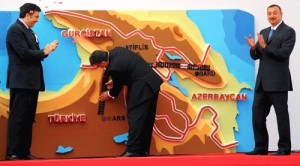 The Baku-Tbilisi-Kars (BTK) Railway was opened Oct. 30 in a ceremony in Baku, the capital of Azerbaijan. The presidents of Azerbaijan and Turkey and the prime ministers of Kazakhstan, Uzbekistan, and Georgia, as well as delegates from Turkmenistan and Tajikistan, attended the ceremony. This inauguration was described as a historical event because of the importance of the project’s mission ― the BTK Railway is called the “Iron Silk Road” in the region.
The Baku-Tbilisi-Kars (BTK) Railway was opened Oct. 30 in a ceremony in Baku, the capital of Azerbaijan. The presidents of Azerbaijan and Turkey and the prime ministers of Kazakhstan, Uzbekistan, and Georgia, as well as delegates from Turkmenistan and Tajikistan, attended the ceremony. This inauguration was described as a historical event because of the importance of the project’s mission ― the BTK Railway is called the “Iron Silk Road” in the region.
The BTK Railway was planned during the ending process of the Baku-Tbilisi-Ceyhan pipeline and the construction began in 2007. The 846 kilometers of the railway connects Azerbaijani, Georgian and Turkish railways and links to European and Asian railways. Due to the technical and geographical difficulties, the process took ten years to complete. It provides the shortest link from China to Europe for the transportation of goods and people. From the beginning, up to 6 million tons of cargo and 1 million passengers will be carried every year. It is projected that the level will gradually increase to 17 million tons of cargo and 3 million passengers in the coming years.
Currently, the contribution of China to this railway is expected because of the high-level transportation necessities in the region. Here, mutual interest appears for China. The country is linked to Europe via Russia so the BTK Railway would help to reduce the load of goods travelling via that route. Chinese cargo can reach Kazakhstan’s Caspian Sea port first and it will be ferried to the port of Azerbaijan. The cargo will then be freighted on the BTK Railway to reach Europe in 15 days.
Azerbaijani President Ilham Aliyev called the BTK Railway a “historic project” and described the new period by saying, “It will increase the geopolitical importance of our countries and open up new opportunities for us.”
The project will improve economic relations between the countries and create regional integration. It has significant meaning because, after the collapse of Soviet Union, the Caucasus region suffered from economic troubles, political chaos, and ethnic-regional conflicts. In the 1990s, the local conflicts in the Northern Caucasus and the accompanying terrorism threatened investments. In the Southern Caucasus, the Armenian occupation in Nagorno-Karabakh and the Russo-Georgian War changed the trust environment for upcoming projects.
Today some of the problems have been solved with the help of natural resources and economic opportunities. Azerbaijan, Georgia, and Turkey worked to realize admirable regional projects such as the Baku-Tbilisi-Ceyhan Oil Pipeline and the Baku-Tbilisi-Erzurum Gas Pipeline.
Turkish President Recep Tayyip Erdogan said, “We hereby announce the establishment of an uninterrupted railway line from London to China,” and then declared upcoming projects will also contribute to the regional and global economy.
Georgian Prime Minister Giorgi Kvirikashvili also called other countries to be part of new projects, saying, “BTK is a new Eurasian Bridge. The geostrategic position of our countries endows us with the unique opportunity to be a connecting bridge between Europe and Asia. The new railroad line will considerably alter the existing economic reality and create totally new conditions for development.”
The presidents are showing the reality of global interests, because this is an age of cooperation to gain economic benefits from everywhere and everything. Thus, we are witnessing other initiatives by Russia and Iran for the construction of the North-South Transport Corridor as one of the most important regional projects which will create a connection by rail, ship and land from India to Europe via passing through the Caucasus region.
The Caucasus was called “the region full of potential conflicts” until today. But from now, we are called, “the region full of potential cooperation.”
Mehmet Fatih Oztarsu – The Korea Times
http://www.koreatimes.co.kr/www/opinion/2017/11/162_239592.html

 Kasım 20th, 2017
Kasım 20th, 2017  oztarsu
oztarsu  Posted in
Posted in  Tags:
Tags: